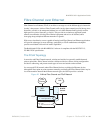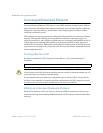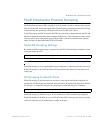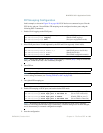
BLADEOS 6.5.2 Application Guide
BMD00220, October 2010 Chapter 14: FCoE and CEE 195
FCoE Initialization Protocol Snooping
FCoE Initialization Protocol (FIP) snooping is an FCoE feature. In order to enforce point-to-point
links for FCoE traffic outside the regular Fibre Channel topology, Ethernet ports used in FCoE can
be automatically and dynamically configured with Access Control Lists (ACLs).
Using FIP snooping, the G8124 examines the FIP frames normally exchanged between the FCF and
ENodes to determine information about connected FCoE devices. This information is used to create
narrowly tailored ACLs that permit expected FCoE traffic to and from confirmed Fibre Channel
nodes, and deny all other undesirable FCoE or FIP traffic.
Global FIP Snooping Settings
By default, the FIP snooping feature is turned off for the G8124. The following commands are used
to turn the feature on or off:
Note – FIP snooping requires CEE to be turned on (see “Turning CEE On or Off” on page 192).
When FIP snooping is on, port participation may be configured on a port-by-port basis (see below).
When FIP snooping is off, all FCoE-related ACLs generated by the feature are removed from all
switch ports.
FIP Snooping for Specific Ports
When FIP snooping is globally turned on (see above), ports may be individually configured for
participation in FIP snooping and automatic ACL generation. By default, FIP snooping is enabled
for each port. To change the setting for any specific port, use the following CLI commands:
When FIP snooping is enabled on a port, FCoE-related ACLs will be automatically configured.
When FIP snooping is disabled on a port, all FCoE-related ACLs on the port are removed, and the
switch will enforce no FCoE-related rules for traffic on the port.
RS G8124(config)# [no] fcoe fips enable
RS G8124(config)# [no] fcoe fips port <port alias, number, list, or range> enable


















